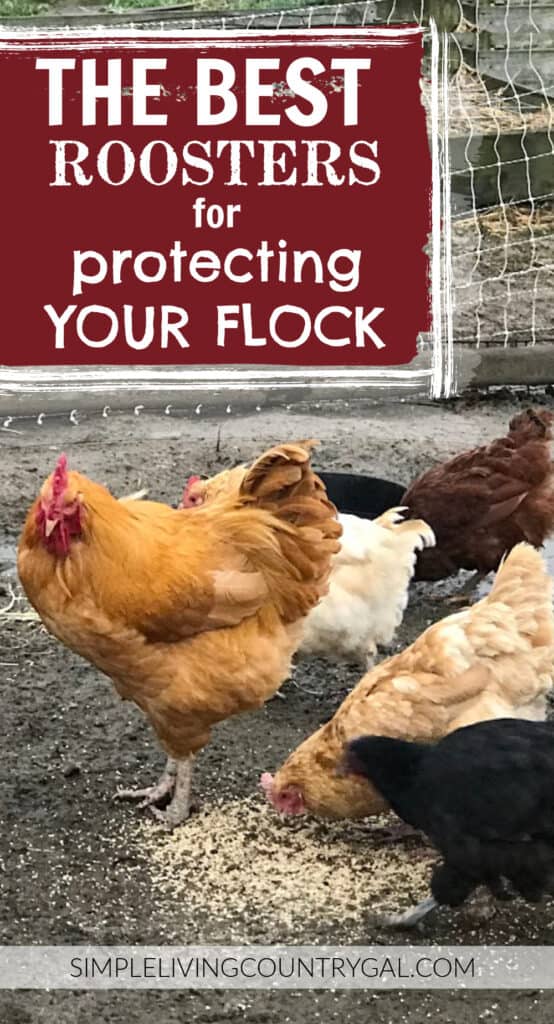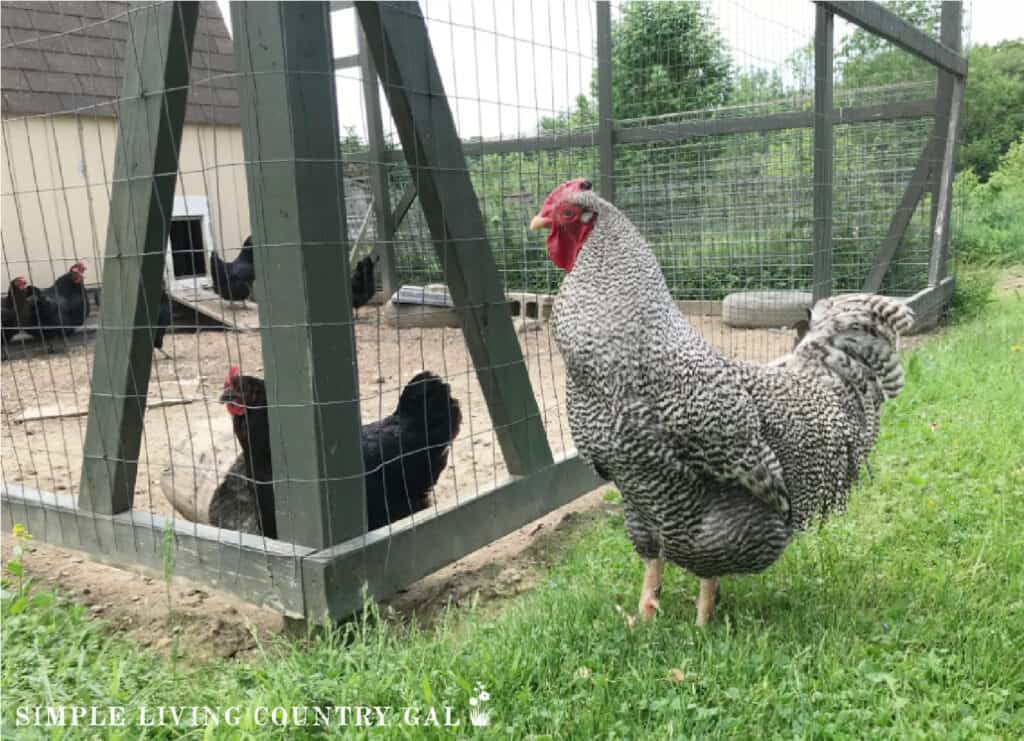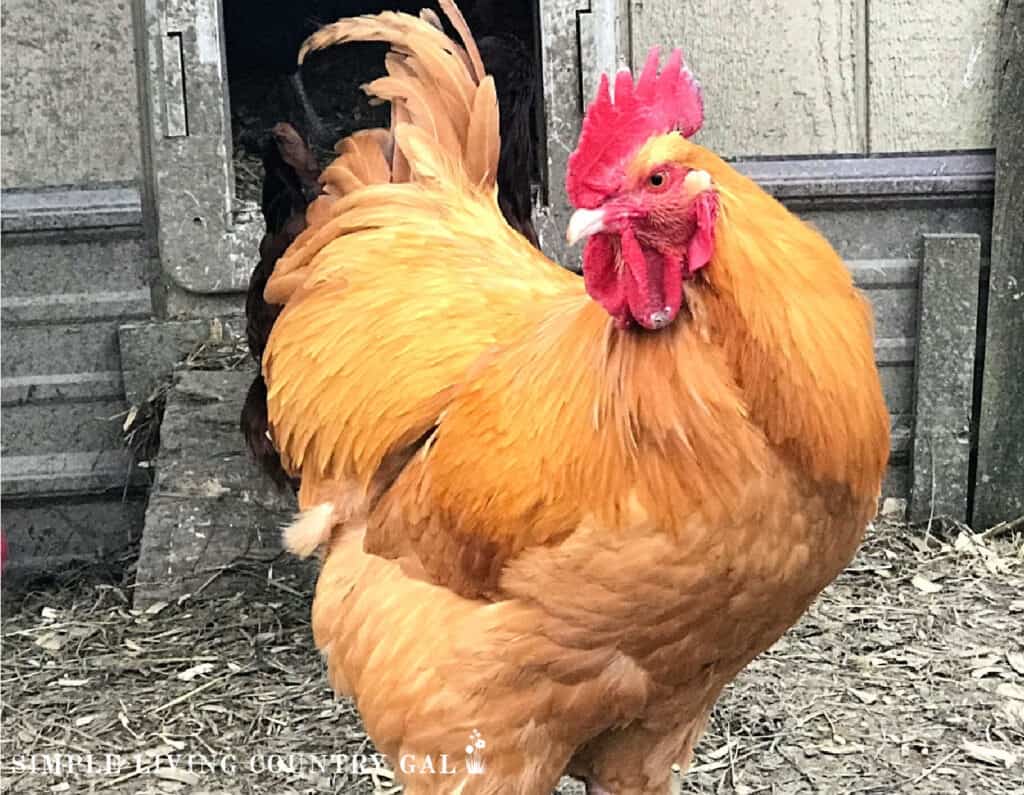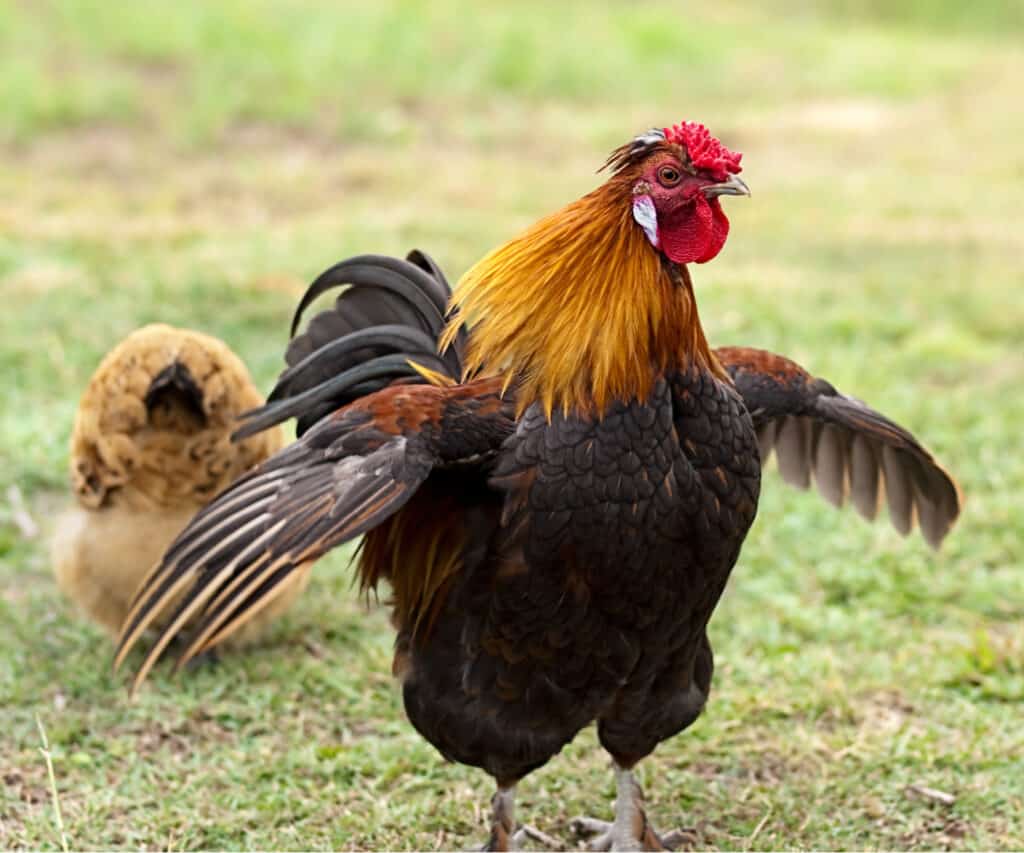Best Roosters for Protection
Keeping your flock safe is always at the forefront of our minds as chicken owners. We build coops that are secure and outdoor runs with high protective sides. If you are looking for more, you can enlist some help with this list of the best roosters for protection.
Raising chickens that are protected from predators so they can give you loads of farm fresh eggs all year long.

As a chicken owner, protecting your flock from predators is a top priority, and having a rooster on guard can provide an added layer of protection during the day. This is especially helpful if you free-range your chickens where there is much less protection than what you may find in a coop and run. Be sure to choose a rooster from our list of the best roosters to protect your entire flock.
How do roosters protect hens?
Roosters are the natural protectors of their flock and will do whatever it takes to keep their hens safe. They have several ways of protecting their hens, including:
- Keeping a lookout: Roosters have excellent eyesight and are constantly scanning their surroundings for any potential threats. They will often patrol around near where the hens are scratching, doing little eating of their own.
- Warning calls: Roosters have a distinct crow that can be heard for miles. They will use this call to alert the hens and their owners of any danger in the area.
- Fending off predators: If a predator does come near the flock, the rooster will use its sharp spurs and strong beak to fend it off. They will jump aiming their feet at any potential threat and can do a surprising amount of damage when doing this. They are not afraid to fight for their hens and will do so until the predator retreats.
- Leading the flock: Roosters also act as leaders of the flock, guiding them to food sources and water while keeping an eye out for potential dangers along the way.
Overall, having a rooster in your flock who takes his job seriously is a great way to protect hens during the day and at night. However, not all roosters are good protectors, let’s look at some of the qualities to look for in a rooster breed.

What are the qualities to look for in a rooster?
If you are considering adding a rooster to your flock for protection, there are certain qualities you should look for in a rooster:
- Size and strength: A larger and stronger breed of rooster will be better equipped to fend off predators.
- Protective instincts: Look for a breed that is known for attentiveness to the safety of its hens, as it will constantly keep watch and take action when needed.
- Good temperament: A rooster breed with a calm and friendly demeanor will be easier to handle and less likely to become aggressive towards humans. A common reason as to why many chicken owners do not add roosters to their flocks.
- Compatibility with your hens: It’s important to choose a breed of rooster that gets along well with your hens and is not overly aggressive or dominant towards them.
Qualities of a good rooster that will protect and not harm the hens or you is always a good list to keep in mind.
What are the best roosters for protection?
Some rooster breeds are known for their protective nature and make great guardians for your flock. Here are a few to consider:
- Brahma: This large breed is known for its calm demeanor and ability to protect its hens. They can also keep watch over a larger area due to their size.
- Rhode Island Red: These roosters have a strong instinct to protect their flock and are not afraid to confront predators. They also do well in colder climates where snow is common.
- Silkie: Despite their small size, Silkies are known for their bravery and will fiercely defend their hens.
- Australorp: This breed is highly alert and will quickly sound the alarm if it senses danger. They are also great at leading their flock to safety.
- Orpington: These docile and friendly roosters are known for their protective instincts towards their hens. They are also great at protecting young chicks.
- Barred Rocks: We have always had these roosters in our flock because they do a great job at protecting hens; however, they can be a bit aggressive towards people. Read below for tips on what you can do if you have a people aggressive rooster.
These are just a few of the many breeds that make good protectors for your flock. It’s important to do your research and find a breed that fits well with your specific needs and environment. Remember, a good rooster is not only a protector but also a companion for your hens and yourself.

How can you train a rooster to be a protector?
If the rooster you choose doesn’t already have protective instincts, there are ways to train them to become better guardians for your flock:
- Socialization: Introduce the rooster to different situations and people so they become comfortable with their surroundings and learn how to react in different situations.
- Positive reinforcement: Reward the rooster for exhibiting protective behaviors, such as sounding the alarm or defending against predators.
- Training commands: Teach the rooster basic commands like “stay” and “come” so you can control their behavior in situations where they may become too aggressive.
- Be a good role model: As the flock leader, your behavior sets the tone for how your rooster will act. Remain calm and assertive in situations that may cause the rooster to become aggressive.
How do you deal with an aggressive rooster?
While a protective rooster is beneficial for your flock, an overly aggressive rooster can be dangerous and disruptive. If a rooster attacks you, be sure to stand your ground and mimic his behavior, doing your best to look bigger than he is.
Flag your arms and stand tall to show the rooster you are larger and to back down. You can also walk or charge towards him to hopefully back him off. Do not run or walk away, as this tells him he is in charge and he will continue this behavior.

How to Teach a Rooster Your Dominance
These steps mimic how one rooster shows dominance over another.
#1. Wearing gloves, catch your rooster and hold him under your arm close to your side.
#2. Using both hands, place him on the ground firmly yet gently holding him into place with one hand.
#3. Using your free hand, place it on his upper neck and move his head low to the ground. Hold him in this position for a few seconds. This action mimics how one rooster shows dominance over another.
Repeat steps 1-3 until your rooster stops coming at you and attacking you.
No matter which rooster you choose, make sure to always provide a safe and secure environment for your flock. This includes ensuring proper housing, fencing, and regular predator checks. With the right breed and training, a rooster from this list of Best Roosters for Protection can be a valuable asset to protecting your flock from potential predators.
